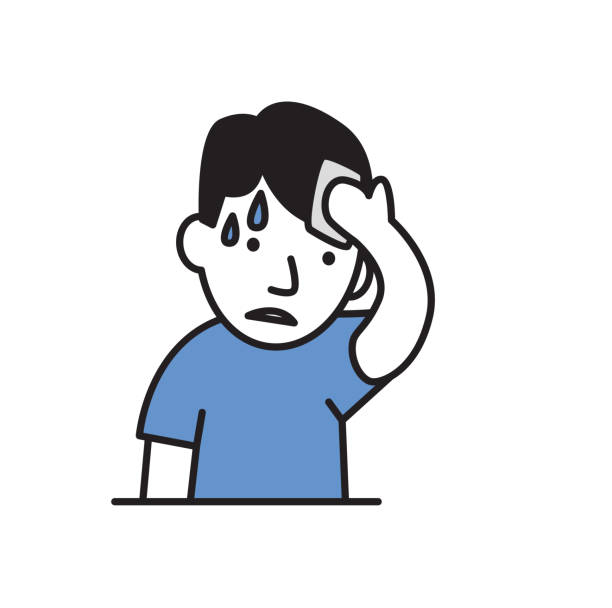Anxiety sweating is a real thing, and if you’re one of the millions of people who suffer from it, you know how embarrassing and frustrating it can be. You may feel like you’re the only one who experiences this type of sweating, but you’re not. In this blog post, we will discuss what anxiety sweating is, what causes it, and how to deal with it. We hope that by reading this post, you will have a better understanding of anxiety sweating and how to manage it.
Defining Anxiety
Anxiety is a feeling of worry, nervousness, or fear. It is a normal human emotion that everyone experiences at one time or another. When someone has anxiety, they may feel like they are in danger, even when there is no real threat. For some people, anxiety can be so severe that it interferes with their daily life.
Anxiety And Sweating

Anxiety sweating is a type of sweating that occurs when someone experiences anxiety or a panic attack. It is usually more severe than normal sweating and can be very embarrassing. Anxiety sweating can occur on any part of the body, but it is most common on the hands, feet, and armpits.
It is important to note that anxiety sweating is not the same as hyperhidrosis, which is a condition that causes excessive sweating. While anxiety sweating can be frustrating and embarrassing, it is not a medical condition and does not require treatment.
Signs
There are a number of different signs and symptoms that can indicate someone is experiencing anxiety sweating. These include:
- Sweating more than usual
- Sweating even when it’s not hot
- Having clammy or wet hands
- Having sweaty palms
- Experiencing excessive foot sweating
- Having to change clothes frequently due to sweating
- Avoiding social situations due to embarrassment about sweating
Causes
There are many different things that can cause someone to experience anxiety. These may include:
- A traumatic event: witnessing or experiencing a traumatic event can cause anxiety.
- Stress: stress from work, school, or personal life can trigger anxiety.
- Genetics: anxiety can run in families and may be caused by genetics.
- Medical conditions: some medical conditions, such as thyroid problems or heart disease, can cause anxiety.
- Certain medications: such as beta-blockers and antidepressants. If you think your medication is causing your anxiety, talk to your doctor.
One can develop anxiety due to one or more of the above causes. It is important to speak to a doctor if you think you may be suffering from anxiety, as they can help you find the best treatment for your specific situation.
Effects

Anxiety sweating can have a number of different effects on someone’s life. These may include:
- Interference with daily activities: anxiety and sweating can make it difficult to do things that require the use of your hands, such as typing or writing.
- Embarrassment and social isolation: people who suffer from anxiety sweating may avoid social situations due to embarrassment about their condition. This can lead to social isolation and feelings of loneliness.
- Difficulty concentrating: anxiety and sweating can make it difficult to concentrate on tasks, such as work or schoolwork.
- Causing other problems: anxiety and sweating can also lead to other problems, such as skin infections.
All of these effects can lead to a decrease in quality of life. If you are experiencing any of these effects, it is important to speak to a doctor.
Treatment

There are a number of different treatments that can help someone manage their anxiety sweating. Some of these include:
- Medication: There are a number of different medications that can be used to treat anxiety and sweating. These include anticholinergics, beta-blockers, and antidepressants.
- Botox: Botulinum toxin injections can help to temporarily stop sweating. This treatment is usually only used for severe cases of anxiety or sweating.
- Iontophoresis: This is a procedure that uses electrical currents to block the sweat glands from producing sweat. It is usually only used for severe cases.
- Surgery: In some cases, surgery may be necessary to remove the sweat glands. This is usually only done for severe cases that do not respond to other treatments.
If you suffer from anxiety sweating, there are a number of different hacks and tricks that you can use to help manage your condition. Some of these include:
- Wearing loose-fitting clothing: wearing tight-fitting clothes can make sweating worse. Loose-fitting clothes will help to keep you cool and dry.
- Carrying a handkerchief or tissue: carrying a handkerchief or tissue with you can help to absorb sweat.
- Using antiperspirants: using an antiperspirant that contains aluminum chloride can help to reduce sweating.
- Eating spicy food: eating spicy food can help to temporarily stop sweating. Capsaicin, the compound that makes peppers hot, can also be found in topical creams and lotions.
Additionally, you may also adapt to some lifestyle changes to help manage your anxiety and sweating. These may include:
- Exercise: Regular exercise can help to reduce stress and anxiety.
- Yoga: Yoga can help to relax the mind and body and reduce stress.
- Relaxation techniques: such as deep breathing or meditation, can help to calm the mind and body.
- Healthy diet: Eating a healthy diet can help to reduce stress and anxiety.
- Hydration: Staying hydrated can help to reduce sweating.
Anxiety and sweating can be difficult to live with. However, there are a number of different treatments that can help you manage your symptoms and improve your quality of life. If you think you may be suffering from anxiety or sweating, speak to your doctor for more information. By following the tips above, you can help to control your anxiety and keep your sweat under control.
Conclusion
Anxiety sweating can be a nuisance. It is important to seek medical help if you think you may have anxiety. There are a number of treatments that can be used to manage both these conditions. You may want to consider speaking to your respective healthcare provider for more information and a custom treatment plan.
For more information, please contact MantraCare. Anxiety is a common mental health condition characterized by persistent feelings of worry, fear, and apprehension. If you have any queries regarding Online Anxiety Counseling experienced therapists at MantraCare can help: Book a trial Anxiety therapy session


